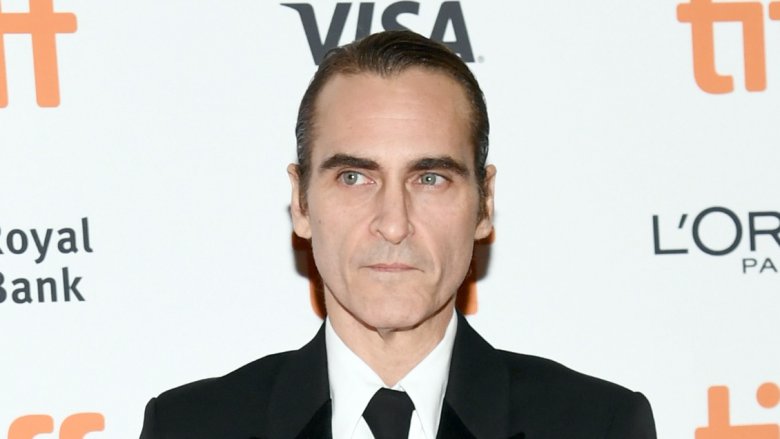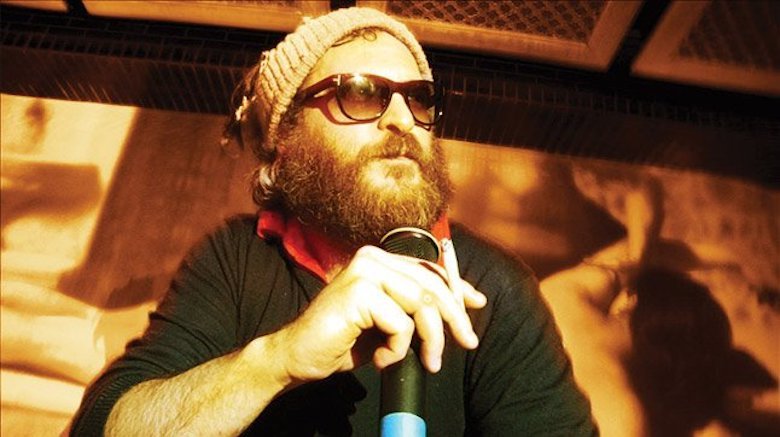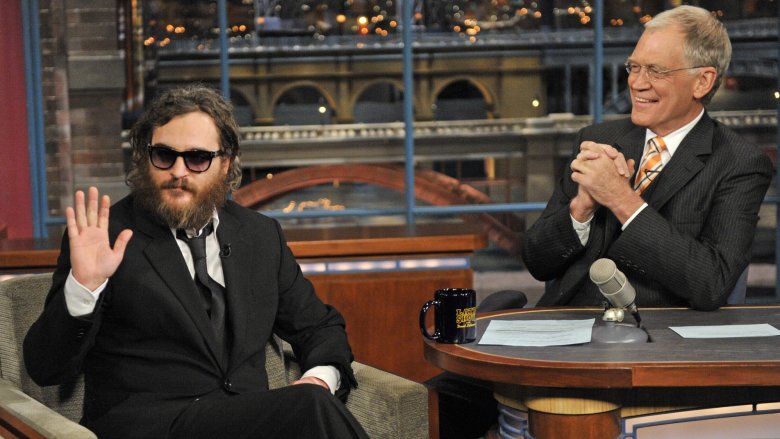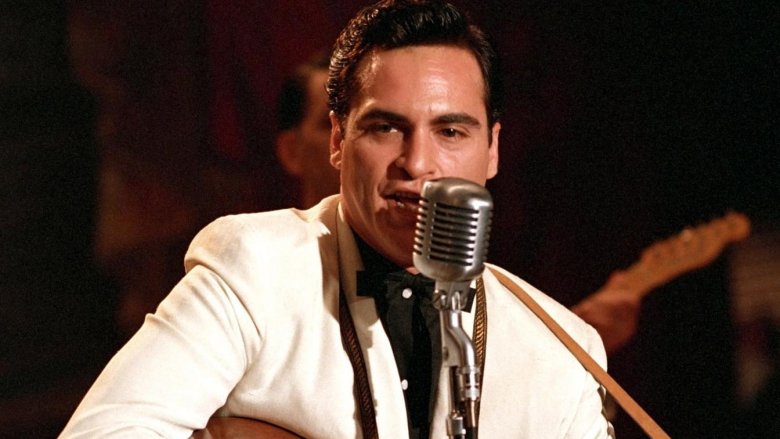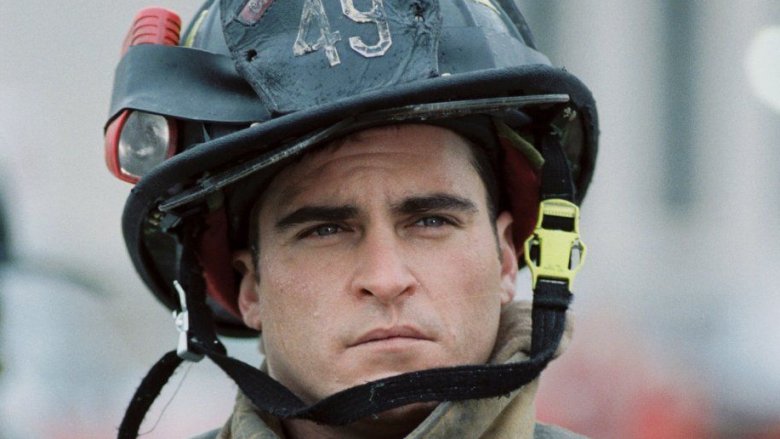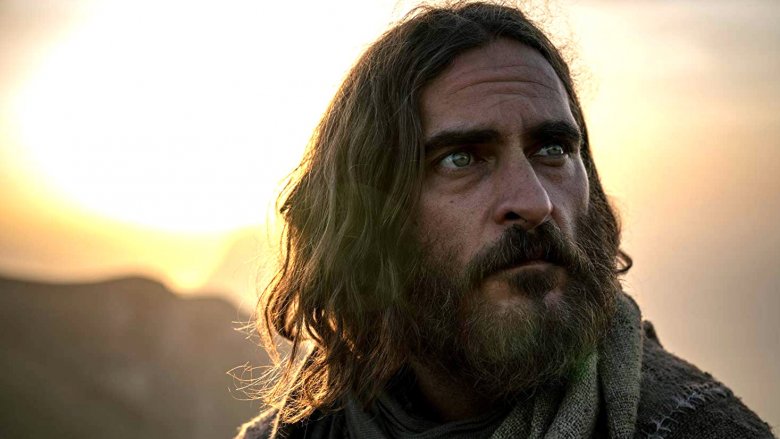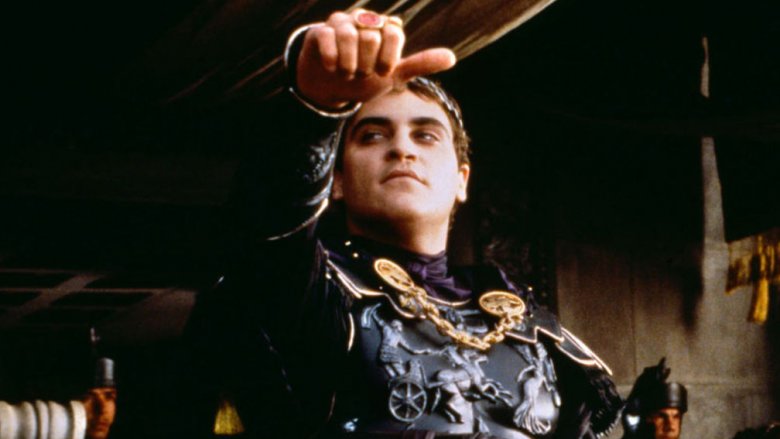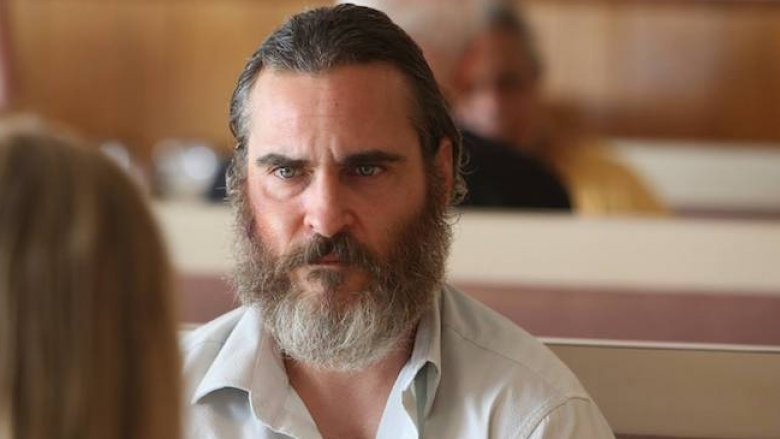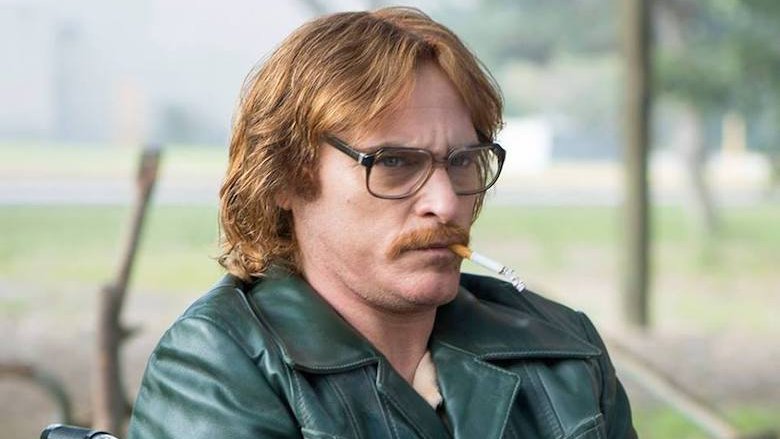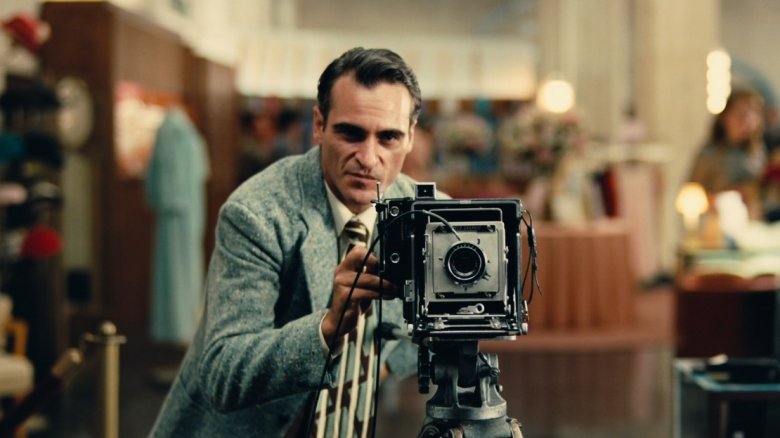The Craziest Things Joaquin Phoenix Has Ever Done For A Role
Joaquin Phoenix is brilliant, he's talented, he goes to incredible lengths to research and embody his roles. Sometimes, he even refuses to get out of character for the entire filming of a movie — even when that lasts upwards of a year. Bottom line: The man is all in, all the time.
Why all the intensity? It could be a result of his super-unconventional journey. His family spent five years traveling Central and South America as part of the Children of God cult. He and his five siblings started busking when they returned to the U.S., landed an agent, and started acting. He changed his name to Leaf for a time. He was the one who called 911 the night his brother River died of an overdose at The Viper Club. And legendary filmmaker Werner Herzog may have once saved him from a car crash. He lives an odd, eccentric, adventurous life.
Besides, no matter how strange his methods might appear, the way he really throws himself into his roles pays off. With that in mind, these are the craziest things Joaquin Phoenix has ever done for a role.
He derailed his career for nearly two years...
How's this for over the top: Phoenix pretended to walk away from acting, lose his mind, and start a music career. For 18 long months. As a joke. Now that's commitment. It started like most things gone incredibly awry do — as an idea between friends. He and Casey Affleck, who is married to Phoenix's sister Summer, were discussing the nature of celebrity and how it seems no one can turn away when a famous person turns into a total trainwreck.
But then they took it a step further. What if Phoenix became one of those trainwrecks, with Affleck filming his every drug-addled moment, to show people the corrosive effect of being a celebrity? Soon, the two decided to go for it. Phoenix would "quit" acting and begin rapping. Affleck would follow his every embarrassing move. And best of all, no one would know the movie they were filming to document this transformation was an elaborate hoax (well, except for P. Diddy, Ben Stiller, Natalie Portman and Edward James Olmos).
What could go wrong, right? "The film started as a running joke," Phoenix told The Guardian. "It was like an SNL sketch: how does a 35-year-old retire from acting?... So I thought: 'Let's take that idea and make a really... perverse version of it — like an R-rated sitcom.' But then it got out of control. It just went everywhere."
...And acted crazy 24/7
The performance art started, and Phoenix appeared increasingly bloated and unkempt in public. Rumors swirled as he started a fight with an audience member and fell off the stage while rapping. (He told Entertainment Weekly Chevy Chase was the inspiration for the pratfall.) He said horrible things about people in print interviews. On television, no one knew exactly what he was trying to say.
Nowhere was this madness more apparent than on The Late Show with David Letterman. Phoenix was disheveled, confused, and all but unintelligible. He answered questions in mumbled babble. Letterman eventually gave up trying to make sense of what was happening, quipping, "What can you tell us about your days with the Unabomber?"
After the film came out, Affleck and Phoenix admitted the 18-month downward spiral was all a big joke. As Affleck explained to the New York Times, he wanted "audiences to experience the film's narrative, about the disintegration of celebrity, without the clutter of preconceived notions." Phoenix later apologized to Letterman and said filming I'm Still Here liberated his career. He told Time, "I wanted to put myself in a situation that would feel brand-new and hopefully inspire a new way of approaching acting. It did do that for me." Indiewire applauded the courage it takes to risk "your entire career to prove a point, or to gain a ton of weight, grow a beard, and get on stage only to rap really (really) badly."
Went full-on method
In 2005's Walk the Line, Phoenix plays legendary country star Johnny Cash. While Cash was a tall, strapping 6'1", Phoenix is a mere 5'8". Cash had a booming baritone; Phoenix's singing voice had always been more in a John Lennon or Bowie octave. And yet somehow, against all odds, Phoenix virtually became the Man in Black in the movie.
How? Maybe spending months at a rock 'n roll boot camp had something to do with it. Or the way Phoenix gobbled up the singer's biographies and played guitar relentlessly during filming. Or that he took a little jaunt to rehab, like Cash had, in the middle of it. Or that during the Folsom Prison scene, he made crew members treat the extras as real inmates, refusing them food and water, to create the appropriate tension. Or that Phoenix stayed in character the entire time, making everyone call him J.R. (Johnny Cash's real name). "'I'm embarrassed about it now," he told Entertainment Weekly. 'But when I heard 'Joaquin,' it just didn't feel right.'"
Whatever the reason, all the way-out there stuff paid off. Phoenix's inspired performance earned him an Academy Award nomination and won a Golden Globe Award. (He seems truly surprised in his acceptance speech when he exclaims, "Whoever thought I would win in the Comedy or Musical category!") Keep channeling your characters, Joaquin. It works for you.
Actually became a firefighter
To play a firefighter convincingly, do you actually have to become one? If you're Phoenix, the answer is a resounding yes. Not content to simply interview firefighters about how being trapped in a burning building feels — which Phoenix did to research his role in Ladder 49 — he took it miles further.
Phoenix actually enrolled in the Baltimore Fire Academy to learn the ins and outs of the profession. He put in the hard work, met the physical demands, and graduated. Soon he was riding along with Crew 10 as a real fireman, putting out real fires. He even got tattooed with the unit's mascot, Busy Bee, to remember his time with them. "I wanted to have the experience of seeing what the kids were like in the academy because my character was seen as a rookie," he told People.
The film's director, Jay Russell, told Firehouse magazine, "He (Phoenix) fully commits to a part. He doesn't just pretend to be a character, he becomes the character, and that's why he went through such extensive training and research for the film." As for Phoenix? The reaction from the firefighting community is the ultimate payoff for everything he went through. "Firefighters see this film and feel that it's an accurate depiction of their life. And that's all that we can ask for," he said in an interview with Reba Merill.
Starved himself
How do you prepare to play one of the most revered figures in history? If you're Phoenix, you start by digging down deep into all four gospels and concluding the information presented is so contradictory, you start to cherry-pick what you like to get into character. "We always think about the spirit and mythical side of Jesus, but I was trying to find the humanity," he told the Village Voice about researching his role in Mary Magdalene.
Scholarly activity aside, Phoenix also embarked on a rigorous 300-calorie-a-day diet to appear properly emaciated as Jesus. He told The Independent the process was "brutal." His understandable hunger was further amplified by filming in Sicily, "where you just wanna roll out and eat some good pasta and have a glass of wine."
To complete the physical transformation, Phoenix grew his hair into a wild mane and sported a bushy, unkempt beard. And once again, he seemed to vanish into his character. As director Garth Davis told Esquire, "Working with Joaquin is like working with this beautiful wild animal, where you have to give him the space to be free, so his performance can roam freely: raw, uncontrived and truly natural ... There was no other person in my mind who could have played Jesus."
Gained weight, cut his hair and carried a sword everywhere
In Gladiator, Phoenix plays Commodus, a villainous historical figure. Uncharacteristically, the actor was extremely nervous arriving on set. At one point, he even told director Ridley Scott, "This just isn't going to be possible."
Richard Harris, who played Marcus Aurelius, tried to loosen Phoenix up with alcohol. Scott ran through hours of takes without film in the camera just to get him to calm down. Phoenix carried a sword on set and also kept one in his hotel room. And somewhere along the way, things clicked. He told The Guardian, "So one morning I was studying the script, and lightning struck. I thought, "F*** ya! I geddit!" I went out and cut my hair and added some weight. To start with, I was toned. But I made him flabbier, to show how this scrawny prince had kinda ripened into an emperor."
Leave it to Phoenix to find both the humanity and hurt little boy in an otherwise sadistic character. "I discovered the child in him," he added. "He was only 19 when he became emperor. You know, the guy's father ran the Roman Empire, which is like the biggest multinational ever, and Commodus just hates the f***ing suit and tie they make him wear!'" Chubbing out and playing with swords paid off; Gladiator earned Phoenix both Oscar and Golden Globe nominations and made him a star.
Packed on more pounds and made it up as he went along
Joaquin Phoenix was chubby as Commodus, emaciated as Jesus, and grew a dad bod for 2017's You Were Never Really Here, in which he played Joe, a traumatized military vet trying to rescue a kidnapped girl. Though Phoenix continued to work out during filming, he also sports a visible paunch. "I thought he (Joe) should be as big as possible, but I also didn't want the standard Hollywood body for getting big," Phoenix told Vulture. "He's somebody who's mid-life and has kind of fallen off in some ways."
Even more striking than his physical transformation is the way Phoenix and director Lynn Ramsey made the movie. Because Ramsey had to push up filming to accommodate Phoenix's otherwise committed schedule, the script was still being worked on up to and during filming. The movie was shot in a mere 29 days, with Phoenix making his performance up and Ramsey furiously rewriting as they went along. The director gave Phoenix complete license to do whatever he wanted, shooting many different takes of scenes. The result, Ramsey told Esquire, is a "a creative storm."
Per usual, Phoenix's unique methods totally paid off. He earned Best Actor at the Cannes Film Festival for his work in the film. (He was actually so shocked he'd won, he can be seen mouthing "Do I have to go up there?" to girlfriend Mara Rooney at the ceremony.)
Spent months perfecting how to be quadriplegic
In Gus Van Sant's Don't Worry, He Won't Get Far on Foot, Phoenix plays John Callahan, a disabled cartoonist. In typical Phoenix fashion, he studied the memoir the movie is based on and cartooning. "We had comics when I was a kid, but when I saw cartoons I never thought much of it. But I started reading his book and realized what an art form it was." he told Collider.
But that wasn't nearly enough information for Phoenix. He pored over footage of the real Callahan to get a better feel for the man, his physical capabilities, humor and demeanor. And when he'd gotten all he could from that, he headed down to Rancho Los Amigos, a rehab hospital where Callahan had spent time after the accident that left him in a wheelchair. There, he spent months trying to commit Callahan's limited body movements to memory. He talked to both patients and caregivers to find out more about what it's like to suddenly be quadriplegic, so when he had to shoot a scene where he flies out of his wheelchair and onto the asphalt, it was as real as possible.
Wired his jaw shut and spontaneously destroyed the set
In The Master, Phoenix played Freddy Quell, a WWII vet who falls under the spell of a cult leader. According to director Paul Thomas Anderson, he stayed in character for most of filming, and actually hurt himself shooting several scenes.
Freddy also had a menacing sneer, so to maintain a clenched jaw for the entire production, Phoenix actually went to the dentist and had brackets and rubber bands put on his teeth so his jaw stayed shut. He also studied video of wild animals in captivity. "It's pure reaction, and you see the muscles going. I knew that's what I wanted to capture — they're hurting themselves, and they don't even know that, but something inside is saying get out, get out," he explained to the New York Times.
Phoenix eventually got so into his character, he accidentally destroyed a toilet on set during one particularly intense scene. "I told Paul I wasn't going to self-modulate in any way. I wanted to just expose the id," he said in the same Times interview. Anderson, for his part, was extremely pleased with the wild performance. "I knew he was going to be good, but I didn't know he was going to do this," he told the Times. "I was unprepared for the level of inventiveness and creative energy that comes out of him."
